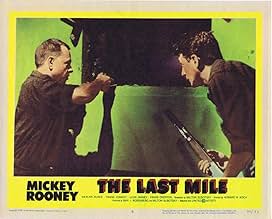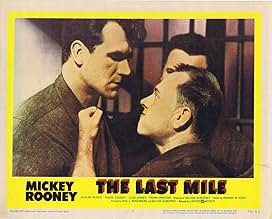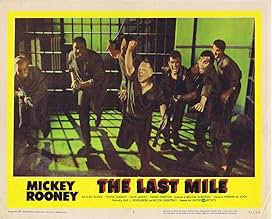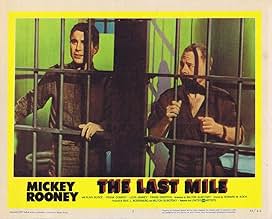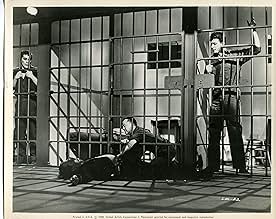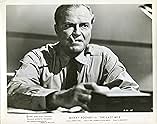NOTE IMDb
6,5/10
384
MA NOTE
Une évasion de prison est tentée la même nuit qu'une exécution dans le couloir de la mort.Une évasion de prison est tentée la même nuit qu'une exécution dans le couloir de la mort.Une évasion de prison est tentée la même nuit qu'une exécution dans le couloir de la mort.
- Réalisation
- Scénario
- Casting principal
Johnny Seven
- Tom D'Amoro
- (as John Seven)
Don 'Red' Barry
- Drake
- (as Donald Barry)
Avis à la une
Clifford Davis is the newest inmate on death row. We get a picture of life on death row, focusing mostly on the terrible waiting, until the systematic abuse by guard "Red" Barry leads to tough-guy inmate Mickey Rooney cracking an instigating a jail break. The last act is an increasingly violent stand-off.
The film is an adaptation of a 1930's play by future blacklisted screenwriter John Wexley. You can see how this could have been intended at one point as an expose (it was adapted as an earlier film in 1932), but this film starts with a title card assuring you that everything you see has already been fixed. What you get here is a very theatrical, violent crime drama. It's not bad, but it's certainly not great either.
It might seem like casting Rooney as a tough guy is far against type, but he played a string of these kinds of roles in the 1950's and early 1960's. He's pretty convincing and really only far exceeds the top in the last few minutes.
The film is an adaptation of a 1930's play by future blacklisted screenwriter John Wexley. You can see how this could have been intended at one point as an expose (it was adapted as an earlier film in 1932), but this film starts with a title card assuring you that everything you see has already been fixed. What you get here is a very theatrical, violent crime drama. It's not bad, but it's certainly not great either.
It might seem like casting Rooney as a tough guy is far against type, but he played a string of these kinds of roles in the 1950's and early 1960's. He's pretty convincing and really only far exceeds the top in the last few minutes.
This remake of The Last Mile has been updated nicely with a nice jazz score and the inmates and prison officials definitely fit the Fifties as opposed to the Twenties when it first appeared on Broadway. But the impact of this searing prison drama hasn't changed and Mickey Rooney stretches his considerable talent to the limit playing the lead of Killer Mears who leads the uprising of the death row inmates.
Mickey has some fast company among the people who've done this part. Spencer Tracy did it on Broadway and his performance there led to his original film contract with Fox. Clark Gable after doing some bit parts and extra work in silent films was spotted doing this in a touring company in Los Angeles which led to his MGM contract. And Preston Foster did it in the original screen version. Rooney's performance stands up to any of their's.
It's a simple plot, but the characters run deep. Before the big attempted breakout we get a character study of each of the inmates on Death Row. It takes a good actor to get himself noticed here though because the character of Killer Mears so dominates the film and the other inmates. These are men with nothing at all to lose, a lot like the inmates shown in The Green Mile. But of course they don't have a character like Mears to whip them in a frenzy when a guard slips and Mears gets the upper hand.
Being that the film is only on one set for 95% of the time, it's a small budget affair, hardly like Ben-Hur which came out the same year. Still Rooney's incredible performance should have merited Oscar consideration. He was nominated for films and performances not half as good as this.
Try to see both the Preston Foster and Mickey Rooney versions together. Too bad we can't see Spencer Tracy or Clark Gable in how they did the role. The Last Mile is timeless as long as we have capital punishment. I can see Russell Crowe doing Killer Mears easily in a 21st Century version.
Mickey has some fast company among the people who've done this part. Spencer Tracy did it on Broadway and his performance there led to his original film contract with Fox. Clark Gable after doing some bit parts and extra work in silent films was spotted doing this in a touring company in Los Angeles which led to his MGM contract. And Preston Foster did it in the original screen version. Rooney's performance stands up to any of their's.
It's a simple plot, but the characters run deep. Before the big attempted breakout we get a character study of each of the inmates on Death Row. It takes a good actor to get himself noticed here though because the character of Killer Mears so dominates the film and the other inmates. These are men with nothing at all to lose, a lot like the inmates shown in The Green Mile. But of course they don't have a character like Mears to whip them in a frenzy when a guard slips and Mears gets the upper hand.
Being that the film is only on one set for 95% of the time, it's a small budget affair, hardly like Ben-Hur which came out the same year. Still Rooney's incredible performance should have merited Oscar consideration. He was nominated for films and performances not half as good as this.
Try to see both the Preston Foster and Mickey Rooney versions together. Too bad we can't see Spencer Tracy or Clark Gable in how they did the role. The Last Mile is timeless as long as we have capital punishment. I can see Russell Crowe doing Killer Mears easily in a 21st Century version.
The movie may be a cheap-jack production, but it also has a number of graphic touches including Rooney's absolutely riveting performance. With its single set, ugly b&w photography, and no-name cast (except for Rooney), I can't imagine the film played more than a few remote drive-in's farthest from town. Nonetheless, the 80-minutes pushes the bounds of 50's movie-making in several notable ways.
For example, catch how much emotional fear the doomed men—whether guards or cons— show when facing death. It's really unusual for that period to risk agitating audiences with realistic fears of death. But this one does. Also, the ricocheting bullets had me ducking under my chair— a really well done special effect. Actually, this cheapo comes closer to Sam Peckinpah's raw depiction of violence than about any film I've seen from that time—bullets actually raise blood, and despite their pleading people do get shot point blank. I'm guessing the producers got away with this because Hollywood didn't much care what a few necking teenagers might use for background.
It's an ugly movie in more ways than one—not a single woman in sight!-- just a bunch of ugly guys. At the same time, the first half too often drags before picking up with the slam-bang second half. Then too, have you ever seen a more barren or squeakier clean cell block, likely a reflection of the story's stage origins. Anyway, it's Rooney at his most intense. And despite the movie's really brutal nature, there are more moments of genuine honesty than in most A-productions of the period. But it's not one you want to see if you're feeling down.
For example, catch how much emotional fear the doomed men—whether guards or cons— show when facing death. It's really unusual for that period to risk agitating audiences with realistic fears of death. But this one does. Also, the ricocheting bullets had me ducking under my chair— a really well done special effect. Actually, this cheapo comes closer to Sam Peckinpah's raw depiction of violence than about any film I've seen from that time—bullets actually raise blood, and despite their pleading people do get shot point blank. I'm guessing the producers got away with this because Hollywood didn't much care what a few necking teenagers might use for background.
It's an ugly movie in more ways than one—not a single woman in sight!-- just a bunch of ugly guys. At the same time, the first half too often drags before picking up with the slam-bang second half. Then too, have you ever seen a more barren or squeakier clean cell block, likely a reflection of the story's stage origins. Anyway, it's Rooney at his most intense. And despite the movie's really brutal nature, there are more moments of genuine honesty than in most A-productions of the period. But it's not one you want to see if you're feeling down.
I wouldn't go so far as to say that Mickey Rooney's the whole show in this movie but that wouldn't be far from the mark. This extremely violent 1959 remake of a 1932 film based on a Broadway play by John Wexley is directed in slam-bang style by Howard Koch, who does such a fine job it could just as easily be Don Siegel or Phil Karlson behind the camera. For fans of the prison genre this is a must see. It has it all.
The plot is basic stuff about doomed men in the big house, how they're treated by the guards, what motivates them, how the prison system works, as Hollywood sees it anyway. In style the film's similar to many period gangster films of its time. Rooney had already played Baby Face Nelson a couple of years earlier. He's in fine form here as a desperate inmate determined to break free. And he takes a lot of people with him in the stunning last half-hour of the film, in which the bullets are flying left and right.
Rooney's performance was so persuasive, he seemed so in tune with his character's mood swings (I don't know how else to put it) that I was practically rooting for him to make it in the end. The supporting cast is filled with some fine actors, ranging from veterans Frank Conroy and Leon Janney, up and comer Michael Constantine, the always distinguished Frank Overton, plus ex-cowboy star Donald "Red" Barry. The Last Miles must have seemed somewhat retro in its day,--prison pictures weren't common around the time it was made-and it plays well now, is curiously viscerally satisfying, and a good example of Hollywood trying to recapture some of the glory of Depression era films, and doing a damn good job of it, too.
The plot is basic stuff about doomed men in the big house, how they're treated by the guards, what motivates them, how the prison system works, as Hollywood sees it anyway. In style the film's similar to many period gangster films of its time. Rooney had already played Baby Face Nelson a couple of years earlier. He's in fine form here as a desperate inmate determined to break free. And he takes a lot of people with him in the stunning last half-hour of the film, in which the bullets are flying left and right.
Rooney's performance was so persuasive, he seemed so in tune with his character's mood swings (I don't know how else to put it) that I was practically rooting for him to make it in the end. The supporting cast is filled with some fine actors, ranging from veterans Frank Conroy and Leon Janney, up and comer Michael Constantine, the always distinguished Frank Overton, plus ex-cowboy star Donald "Red" Barry. The Last Miles must have seemed somewhat retro in its day,--prison pictures weren't common around the time it was made-and it plays well now, is curiously viscerally satisfying, and a good example of Hollywood trying to recapture some of the glory of Depression era films, and doing a damn good job of it, too.
Man I didn't know what I was in for when I sat down to watch this brutal little gem. This portrait of a doomed attempted prison break from a death row cell block hits very hard, and it left me shaking my head in stunned silence.
I'm not surprised to learn from other reviews here that this story began its life as a stage play; most of the action takes place on one set, it features an ensemble cast with multiple meaty roles, and the first half of the film works at a deliberate pace with longer takes and scenes than are conventionally cinematic. It walks a thin line, how to get across the agonizing boredom of being in such a lockup, without becoming boring itself? The answer is to spread dialog around, and to give a lot of weight to mundane events, magnifying tensions and emotions. It gives the excellent cast a lot of room to create, if not exactly sympathy, at least an understanding of where the characters are coming from.
The second half (or maybe final third) of the movie is an altogether different animal, as the ticking timebomb of Mickey Rooney's John Mears explodes into violent retribution. Mears is a complicated character, an atheist and maybe a nihilist, but he cares deeply about his fellow death row inmates. Rooney's performance is AMAZING and dominates this section of the film. Also excellent are Clifford David as the youngest man on the row, next scheduled to be executed, and Frank Overton as Father O'Connors, the priest who gives the condemned men their last rites. His character shows tremendous courage as events spiral into bloodshed; he has a lot more backbone than the guards, who for the most part are sniveling, cowardly, sadistic creeps.
And as others have noted, the jazz score is outstanding, dynamic, punchy, and powerful. It maybe calls attention to itself a little too much, but it's wildly effective in underlining and slapping exclamation points on events throughout the film.
In short, terrific.
I'm not surprised to learn from other reviews here that this story began its life as a stage play; most of the action takes place on one set, it features an ensemble cast with multiple meaty roles, and the first half of the film works at a deliberate pace with longer takes and scenes than are conventionally cinematic. It walks a thin line, how to get across the agonizing boredom of being in such a lockup, without becoming boring itself? The answer is to spread dialog around, and to give a lot of weight to mundane events, magnifying tensions and emotions. It gives the excellent cast a lot of room to create, if not exactly sympathy, at least an understanding of where the characters are coming from.
The second half (or maybe final third) of the movie is an altogether different animal, as the ticking timebomb of Mickey Rooney's John Mears explodes into violent retribution. Mears is a complicated character, an atheist and maybe a nihilist, but he cares deeply about his fellow death row inmates. Rooney's performance is AMAZING and dominates this section of the film. Also excellent are Clifford David as the youngest man on the row, next scheduled to be executed, and Frank Overton as Father O'Connors, the priest who gives the condemned men their last rites. His character shows tremendous courage as events spiral into bloodshed; he has a lot more backbone than the guards, who for the most part are sniveling, cowardly, sadistic creeps.
And as others have noted, the jazz score is outstanding, dynamic, punchy, and powerful. It maybe calls attention to itself a little too much, but it's wildly effective in underlining and slapping exclamation points on events throughout the film.
In short, terrific.
Le saviez-vous
- AnecdotesFilm debut of Milton Selzer.
- Citations
Narrator: Sometimes you have to put your faith in what you can't see. In what you wish.
- ConnexionsReferenced in Toast of the Town: Épisode #12.1 (1958)
Meilleurs choix
Connectez-vous pour évaluer et suivre la liste de favoris afin de recevoir des recommandations personnalisées
- How long is The Last Mile?Alimenté par Alexa
Détails
- Durée
- 1h 21min(81 min)
- Couleur
- Rapport de forme
- 1.85 : 1
Contribuer à cette page
Suggérer une modification ou ajouter du contenu manquant

